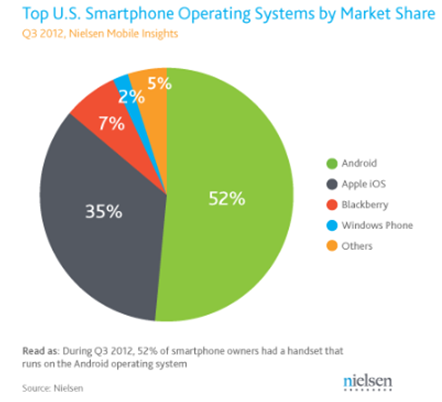iOS, Android, Windows phone 8 or Blackberry 10 – Here are the numbers to help with your mobile strategy
The mobile landscape is changing faster than seasons change here. We still notice that a lot of people want to launch their Apps on iOS or have a strategy primarily around one operating system. However, be it with regular consumers or in the enterprise, you are going to see a wide range of devices running on different versions of iOS, Android or other mobile operating systems. Here are some numbers that will help you with your strategy….

Android has been taking over market share rapidly, especially in emerging markets (China, India etc.). This can be attributed to the wide range of devices at different price points, catering to nearly every segment of the market. See the latest growth statistics below:

Within each operating system, there is further fragmentation of versions. Below are the latest breakdown of OS versions on Android and iOS (iPhone/iPad). Note that while Google publishes Android version breakdowns on their website, Apple does not. The iOS version breakdown here has been compiled by Chitika based on their Ad impressions in North America.
On Android, about 40% are on version 2.3 while another 40% are on Android 4.0+ with the rest sprinkled in-between. Since there is a huge difference between Android 4.0 versions (ICS, JB) and 2.3 (Gingerbread), you need to make sure all the latest UI patterns and features are backward compatible. On iOS, however, it looks like the majority of the users are running on iOS 6+ (time to leverage all the bells and whistles available in iOS 6 without worrying much about older versions).
In the case of windows phone, there are only two versions out there – WP 7+ and WP8 which is unfortunately not backward compatible. So you pick either version or port your WP7 apps to WP8.
So far as the latest Blackberry 10 is concerned, although the operating system is not backward compatible, the good news is that your Android Apps can be ported easily to Blackberry (Watch for a blog post from us on the process soon).
All in all, if you are starting off with mobile development or upgrading your Apps, pick the right platform depending on who and how many users you want to reach out to. At the same time, make sure the code you write and features you use are backward compatible with the older versions currently in the market.
Do you think Android will continue to gain market share? Will Windows Phone or Blackberry regain market share?

